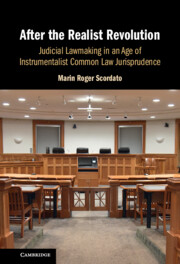 After the Realist Revolution
After the Realist Revolution Understanding the Absence of a Duty to Reasonably Rescue in American Tort Law
Published online by Cambridge University Press: 02 May 2025
This chapter offers an example of classic empirical instrumentalist analysis. The issue is whether American tort law should or should not adopt under the negligence cause of action a general duty to reasonably and affirmatively aid another in peril.
A traditional formalist approach to the question, one that seeks to begin with a first principle of morality that might be thought of as being part of a larger natural law and then engages in an application of deductive logic to reach a conclusion, would almost certainly resolve the issue in favor of adopting such a formal tort law duty, as has much of the developed world.
An instrumentalist analysis, in contrast, would seek to identify and weigh the practical benefits and costs of each plausible resolution of the issue, selecting as the authoritative legal rule the one that promises the best net societal benefit. The degree to which that rule accurately articulated a conventional moral or religious posture would be largely irrelevant.
This chapter develops and presents a thorough instrumentalist analysis of this fascinating and complex issue. In so doing, it provides a rich rationale for the current dominant position of American tort law.
To save this book to your Kindle, first ensure [email protected] is added to your Approved Personal Document E-mail List under your Personal Document Settings on the Manage Your Content and Devices page of your Amazon account. Then enter the ‘name’ part of your Kindle email address below. Find out more about saving to your Kindle.
Note you can select to save to either the @free.kindle.com or @kindle.com variations. ‘@free.kindle.com’ emails are free but can only be saved to your device when it is connected to wi-fi. ‘@kindle.com’ emails can be delivered even when you are not connected to wi-fi, but note that service fees apply.
Find out more about the Kindle Personal Document Service.
To save content items to your account, please confirm that you agree to abide by our usage policies. If this is the first time you use this feature, you will be asked to authorise Cambridge Core to connect with your account. Find out more about saving content to Dropbox.
To save content items to your account, please confirm that you agree to abide by our usage policies. If this is the first time you use this feature, you will be asked to authorise Cambridge Core to connect with your account. Find out more about saving content to Google Drive.